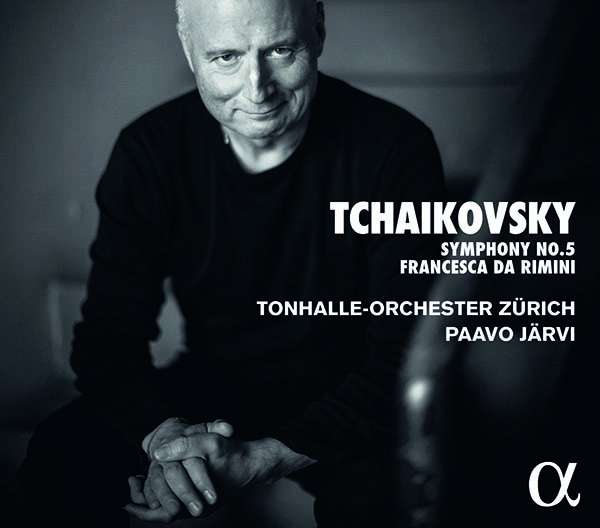 Piotr Tchaikovsky: Symphonie Nr. 5 + Francesca da Rimini op. 32; Tonhalle Orchester Zürich, Paavo Järvi; 1 CD Alpha 659; Aufnahme 2019, Veröffentlichung 06/11/2020 (74') - Rezension von Remy Franck
Piotr Tchaikovsky: Symphonie Nr. 5 + Francesca da Rimini op. 32; Tonhalle Orchester Zürich, Paavo Järvi; 1 CD Alpha 659; Aufnahme 2019, Veröffentlichung 06/11/2020 (74') - Rezension von Remy Franck
An diese Aufnahme ging ich mit großen Erwartungen heran. Vielleicht ist deshalb auch jetzt die Enttäuschung so groß. Tchaikovskys zwischen Tragik und dem Wegwischen tragischer Gedanken oszillierende Fünfte Symphonie kann abstrakt und rein symphonisch interpretiert werden und dabei gut wirken. Der Dirigent kann aber auch versuchen, tief in Tchaikovskys Seele einzudringen, den Schmerz hörbar zu machen und auch, wie der Komponist, mit immer wieder einbrechendem Jubilieren diesen Schmerz verdrängen, ohne je das Fatum zu vergessen, das wie ein Schwert über ihm hängt. Es ist klar, dass Järvi dieser letztgenannte Weg vorschwebte.
Paavo Järvis Zürcher Einspielung ist über weite Strecken schwer und drückend, der Schmerz bleibt aber eher oberflächlich und das Wegwischen schmerzlicher Gedanken klingt nicht wirklich glaubwürdig. Für mich wirkt diese Fünfte auf der ganzen Linie falsch. Es gibt Schwere statt Schwermut, schnelle Tempi statt freudigem Aufschwung. Das Ganze bleibt eher langweilig als ausdrucksvoll, manchmal dramatisch, aber nicht aufgewühlt, es fehlt an Spannung, an Mysterium, an blutvoller Intensität. Ich kann nur wiederholen, was ich schon zu Honecks Vierter anmerkte: Kitajenko – denn seine Aufnahme ist geeicht, sie hat Modellcharakter – Kitajenko also stellt die Kontraste zwischen düsterer Hoffnungslosigkeit und freudigem Aufschwung anders dar als Järvi, weil der Russe auch im freudigen Ausbruch das Kleid des Fatums über die Musik zieht und die Freude in ihrer Widersprüchlichkeit bei ihm fast schmerzlich wird.
Bei Järvi habe ich den Eindruck, dass er hier mal auf die Gefühlstube drückt, dort etwas schattiert, hier aufhellt, aber das alles gibt seinem Dirigieren nicht die Rhetorik, die man in einer großen symphonischen Geste verschmolzen erleben könnte. Vom Orchester hätte ich mir einen Klang mit mehr feinem Innenleben, mehr Raffinement und mehr Transparenz gewünscht.
Auch in der in der Fantasieouvertüre Francesca da Rimini wird kein wirkliches Tchaikovsky-Feuer entfacht. Wo Dudamel oder Stokowski ihre Orchester bis zur Weißglut trieben, mit einer Konzentration und einer Spannung, die das Stück zum großartigen Erlebnis machen, bleibt Järvi bei aller Dramatik doch zu schwer, nicht schlank und federnd genug.
I had great expectations for this recording. Perhaps that is why the disappointment is so great now. Tchaikovsky’s Fifth Symphony, oscillating between tragedy and the wiping away of tragic thoughts, can be performed in an abstract and purely symphonic way, and yet it can be attractive. But the conductor can also try to penetrate deep into Tchaikovsky’s soul, to make the pain audible and also, like the composer, to repress this pain with ever-recurring jubilation, but without forgetting the fate that hangs over him like a sword. It is clear that Järvi had this latter path in mind.
Paavo Järvi’s Zurich recording is often heavy and oppressive, but the pain remains rather superficial and the wiping away of painful thoughts does not really sound credible. For me, this Fifth seems wrong all along the line. There is heaviness instead of melancholy, fast tempi instead of joyful upswing. The whole thing remains more boring than expressive, sometimes dramatic, but not agitated, it lacks tension, mystery and fiery intensity. I can only repeat what I already said about Honeck’s Fourth: Kitajenko – because his recording is calibrated, it has model character – Kitajenko thus presents the contrast between gloomy hopelessness and joyful upswing differently than Järvi, because even in the joyful outburst the Russian pulls the fatum over the music and the joy in its contradiction becomes almost painful with him.
With Järvi, I have the impression that he sometimes presses on the emotional side, shades a bit there, brightens up here, but all this does not give his conducting the rhetoric that one could experience as a grand and deeply breathed symphonic gesture. I also would have liked the orchestra to produce a sound with more subtle inner life, more refinement and more transparency.
No real Tchaikovsky fire is heard in the Fantasy Overture Francesca da Rimini either. Where Dudamel or Stokowski drove their orchestras to raging passion, with a concentration and tension that make the piece a great experience, Järvi remains too heavy in this dramatic music, which lacks refinement and slim elegance.




















